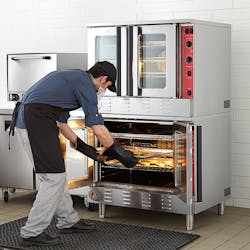California Appeals Court hands victory to Natural Gas-friendly Restaurants
The Ninth U.S. Circuit Court of Appeals has struck down a California city’s municipal ban on natural gas delivery and appliances in new facilities this week, sweeping away, for now, a complete move away from fossil fuels in the region.
The city of Berkeley had approved and enacted the ban in 2020. The measure prohibited the installment of natural gas lines and equipment in favor of electrification in new commercial and industrial buildings.
The California Restaurant Association subsequently filed a lawsuit challenging the ban. Not only would the ban be a problem for the businesses and chefs trained on gas stoves and ovens, the challenge wrote, but the city’s actions was not legal because only the federal government had right to establish energy efficiency as set up by the Energy Policy and Conservation Act.
A California district court ruled in favor of the city of Berkeley, but the CRA took it to the federal appellate level.
“In its complaint, the Association explains that restaurants rely on natural gas for preparing certain foods and that many chefs are trained only on natural gas stoves,” reads the Monday opinion from the Ninth U.S. Circuit Court of Appeals. “And the Association alleges that one or more of its members would like to open or relocate a restaurant in a new Berkeley building completed after the ordinance became effective on Jan. 1, 2020...but those members could not do so because of the ordinance’s ban on natural gas.”
The city countered that the CRA’s allegations did not establish standing to challenge if they did not specify when the restaurants wanted to move into new facilities covered under the rule.
The point is moot, according to the federal court, because Congress previously had enacted the EPCA act as a means of regulation on the quantity of natural gas consumed by certain consumer appliances at the place where those products are used.
“Right off the bat, we know that EPCA is concerned with the end-user’s ability to use installed covered products at their intended final destinations,” reads the Ninth Circuit opinion.
“Equally unavailing is Berkeley’s argument that EPCA’s definition of ‘energy efficiency’ precludes a total prohibition of natural gas piping from being an ‘energy use’ regulation. According to Berkeley, zero cannot serve as the quantity of energy in energy use. . . But in that case, both the denominator (energy use) and the numerator (output) would be zero—which simply yields an indeterminate result.”
The city also asked the federal appellate court to recognize precedent in interpreting the federal Clean Air Act to not preempt local ordinances. But, the Ninth Circuit opinion noted, the U.S. Supreme Court had already rejected that approach.
The California Restaurant Assocation celebrated its victory and highlighted its view that natural gas appliances are crucial for restaurants to “operate effectively and efficiency.”
“They allow for a wide variety of cuisines and innovations in the restaurant industry,” the association statement reads on the value of natural gas for the industry. “Cities and states cannot ignore federal law in an effort to constrain consumer choice, and it is encouraging that the Ninth Circuit upheld this standard.”
The Ninth Circuit is headquartered in San Francisco, fairly close to Berkeley. It is the largest of 13 federal appellate courts and hears appeals from numerous district courts in California, Arizona, Alaska, Hawaii, Montana, Nevada, Oregon, Washington, Idaho and Guam.






